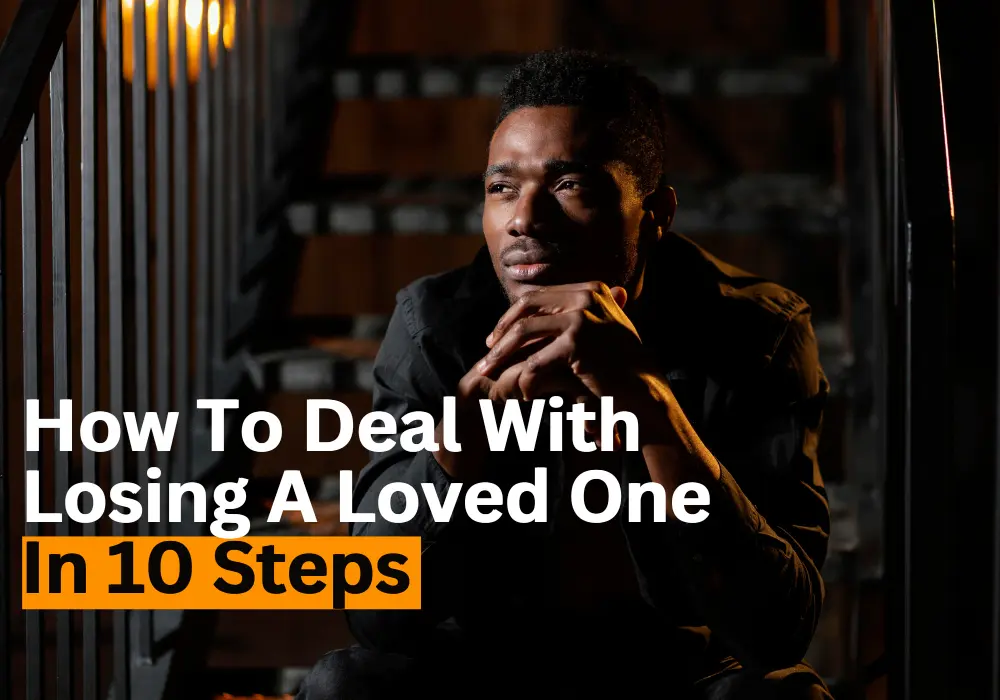Contents
- 1 How To Deal With Losing A Loved One in 10 Steps.
- 1.1 Step 1: Acceptance
- 1.2 Step 2: Find Companionship
- 1.3 Step 3: Use art as an outlet
- 1.4 Step 4: Keep A Diary
- 1.5 Step 5: Create your rituals to honour the dead
- 1.6 Step 6: Don’t trust in the five stages of grief:
- 1.7 Step 7: Preserve your memories
- 1.8 Step 8: Join a support group
- 1.9 Step 9: Take care of yourself
- 1.10 Step 10: Forgive yourself:
- 2 Symptoms of shock after death of loved one.
- 3 Words to comfort someone who lost a loved one.
- 4 Why is it so painful to lose a loved one?
- 5 Is it OK not to cry when someone dies?
- 6 If you found this helpful, consider subscribing to Our Mailing list.
Losing a loved one can be a tough experience for anyone to go through and it feels almost impossible for one to heal and move on. There is no universal method for healing but there are quite a few ways to make the grieving process a little bit more bearable.
In this article, we are going to be shedding light on “How To Deal With Losing A Loved One”. If you have been searching for this, I guarantee that this will be the end of your search because all questions will be answered.
If you are ready let’s get into it immediately.
How To Deal With Losing A Loved One in 10 Steps.
When you have lost a loved one, you’ll need to connect with those who also lost loved ones. Try to maintain the normality of your life. Don’t make any significant changes to your life( moving, job changes, significant relationships) during the first year of your loss. This will help you feel grounded and safe.
There is no quick fix to dealing with grief, it is a slow and continuous process as it is a complex emotional journey. Here are 10 steps to help you deal with grief:
Step 1: Acceptance
The very first step in dealing with the sad loss of a loved one is to accept that it happened… Funny as this may sound to you right now, it is indeed a cold hard truth. it is important to accept your feelings and not let your emotions go numb. Simply put, acceptance is the first step to healing. it is normal to first reject the reality of what has happened but it’s important to consciously own those feelings before they break you.
When my dad (I was only 7), although I was young, I knew he died. I also accepted that I would never see him again. This feeling made me cry once in a while, but accepting the fact was a great relief for me.
Step 2: Find Companionship
The people you surround yourself with are very important at this stage. According to experts, they can either help or hinder your journey. The best companions are those who are just there for us at those critical times of our lives.
In my case, even though my mum was also emotionally down, she was able to provide all the attention I needed because she knew how fond I was of my dad.
Step 3: Use art as an outlet
Art is the most helpful healing method and can help to channel those feelings into something creative. I would simply advise that you do something creative as a means of keeping your mind off the feeling of crying or despair.
It was when my dad died that I discovered I could draw so much… I drew pictures of Jesus just by seeing it on Calendars.
Step 4: Keep A Diary
A lot of people don’t like expressing their thoughts and emotions, instead of bottling it all up, writing your feelings in a journal can also help you understand and channel your emotions.
In my case, I documented everything I loved about my dad, I documented all of the fun things we did together and all of the fun places we went together. As at when this article was written, it is now 21 years since I lost him to the cold hands of death… But each time I read through my diary, I simply smiled instead of crying.
Step 5: Create your rituals to honour the dead
These rituals can be anything you want them to be, it is encouraged to think about what made your loved ones happy when they were alive and do it to honour their memory having afternoon tea was their thing, you could pour them a cup of tea and reflect on the good time while their cup sits there. No matter what you believe in, all that matters is that you can honour their memory.
Step 6: Don’t trust in the five stages of grief:
Some experts have made a list of 5 stages people go through when they lose loved ones. I simply do not advise that you adhere strictly to them as grief is experienced differently by different people. Simply focus on how you are healing presently without worrying about what is to come.
Step 7: Preserve your memories
You can make a memory box full of reminders of your loved one (s). You can write letters to them and put them put them in the box, tell them about your life and about what you are planning to do. Tell them what you have accomplished since their demise etc.
Step 8: Join a support group
If you can, I simply advise that you join a support group. This step was particularly helpful to my mum when my dad passed. There are a lot of support groups with people who have gone through what you are going through, try to join the one closest to you.
You need to carefully review their mission to be sure they are aligned with yours. You should quit any support group that promotes hate and gossip.
Step 9: Take care of yourself
There is an urge to neglect yourself, but do not. Eat well, rest well, exercise, and above all, if you are a follower of Jesus, take consolation from the bible.
In the Beatitude, Jesus says:
Blessed are those who mourn, for they shall be comforted.
Matthew 5:4
Step 10: Forgive yourself:
Sometimes we feel that we cause the death of our loved ones knowingly or unknowingly. You have to forgive yourself for the things you did or didn’t do. It was never your fault.
Although I was 7 when my dad died, I never stopped blaming myself for not becoming a kid star like Shirley Temple and bringing in so much money, maybe my dad would never have gone out to work as an engineer where he died.
Symptoms of shock after death of loved one.
Shock feels like numbness and disbelief. it is our body’s way of protecting us from pain. it can last days or weeks, with the person either excessively crying or unable to laugh. it could be a bodily or emotional response. These are some of the symptoms of shock after bereavement: Sickness, Dizziness, Nausea, Doziness, Numbness, and Emptiness.
You could also have other symptoms like:
- Complete disbelief about what has happened.
- Numbness: feeling nothing initially
- A myriad of other various emotions set in and some people react strangely.
Words to comfort someone who lost a loved one.
People who are grieving are going through a lot right now, saying the right words at this time is very important. The words you say now can either cause the person to spiral down the rabbit hole or console them. Words that best console them are words of love and compassion.
You can try these phrases:
- Can I come around to visit you?
- Would you like to stay over with me for some time?
- I am grieving with you
- Can I help you with anything?
- Take all the time you need, I’m here with you.
Please be considerate and don’t say phrases like:
- I know how you feel.
- Stop crying
- They are in a better place.
- Time heals all wounds
- You can always have another child
When you can’t do or say anything, offer a hug, a shoulder to lie on, and a listening ear. All these actions speak louder than words. Be sincere, their emotions are heightened, and you wouldn’t want to be the one to push them down the rabbit hole.
Why is it so painful to lose a loved one?
As humans, we are social creatures and we connect intimately with people. So when we lose people to whom we are attached, is like the bond is being cut. The pain of detaching from someone who we know is not coming back. The pain could be physical or emotional. This process cannot be rationalized, it is an instinctive human process. The intensity and frequency of emotional response will not let up, for most people that ball of emotion gets smaller but still hurts and you get to relive the same emotional response again. If you are going through a mourning period or you know someone who is, don’t worry it will get better.
Is it OK not to cry when someone dies?
There is nothing wrong with crying when a loved one dies. It is even advisable because it helps to express your healing and facilitate your healing. You cry because you miss them and love them. You may not cry immediately or at all but don’t feel guilty, it happens sometimes. You can grieve alright even without crying.
I hope I have shed some light on things to do when grieving, what to say to comfort and the symptoms of shock. If you have anything you would like me to talk about, let me know in the comment below and subscribe to our newsletter.
If you found this helpful, consider subscribing to Our Mailing list.
Our counsellors publish one content per day and these are rich content on different areas of counselling. Our list of readers is growing and we would love to have you join too.
Twice in a week, we deliver some of our articles to your mailbox. Please subscribe below.


